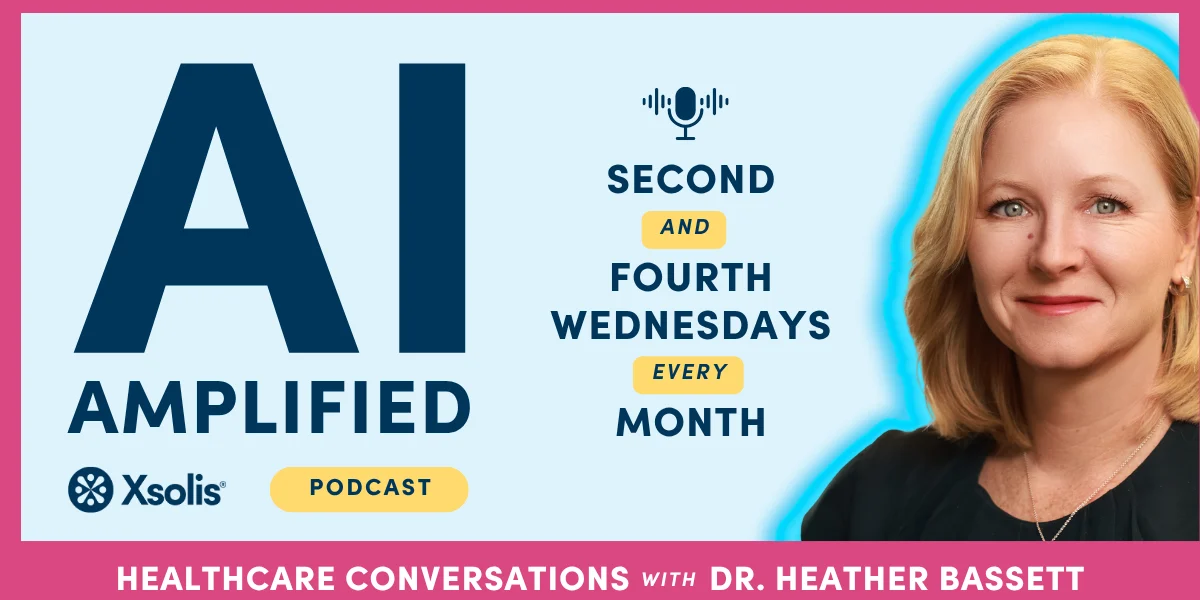Season 1: Episode 3
AI in Pathology
with guest Dr. Peter McCaffrey, Chief AI Officer, UTMB
UTMB’s AI Evolution Journey
Dr. Peter McCaffrey, Chief AI Officer at University of Texas Medical Branch, shared his journey from a humanities major to becoming a board-certified clinical pathologist and AI leader. He explained how his interest in technology and genomics during medical school led him to focus on informatics and eventually AI, culminating in his current role. McCaffrey described how UTMB evolved its approach to AI over seven years, starting with automating tests and expanding to broader applications in diagnosis, interpretation, and patient engagement, which ultimately led to the creation of his Chief AI Officer position. UTMB’s AI Center, launched earlier this year, is under his direction, and was created as a “sandbox” environment to quickly iterate and test AI tools in a low-friction space. The center aims to evaluate the utility and ROI of various AI modules, particularly in healthcare settings, and involves subject matter experts in the testing process to assess potential future workflows
AI Implementation in Healthcare Challenges
The discussion focused on the challenges and opportunities of implementing AI in healthcare, with Peter emphasizing the importance of efficient testing and deployment cycles to stay competitive. Heather noted that healthcare typically moves slowly due to high liability and regulatory concerns, but Dr. McCaffrey argued that it’s possible to move fast responsibly by adopting practices similar to those in other industries, such as using cloud platforms. They discussed the need to mature in their approach to product development, considering pre-deployment testing and evaluation, which can reduce costs and risks associated with deploying new technologies in healthcare.
AI Integration in Pathology Practice
Dr. Bassett and Dr. McCaffrey discussed the integration of AI in pathology, focusing on its applications in both anatomic and clinical pathology. Dr. McCaffrey explained how AI tools, such as heat maps for prostate biopsies, assist pathologists by reducing mental fatigue and improving accuracy. They also touched on the use of AI in clinical pathology, particularly in urine toxicology screening, where AI-generated reports are reviewed and edited by pathologists. Dr. McCaffrey acknowledged the need to adapt to AI’s ability to scale and automate certain tasks, suggesting a shift in focus for pathologists to higher-value activities.
AI’s Role in Medical Imaging
Dr. Bassett and Dr. McCaffrey discussed the implications of using AI in medical imaging and diagnostics, focusing on the potential increase in cognitive load for healthcare professionals. They explored how AI could initially assist by identifying routine cases, allowing experts to focus on complex cases, but also considered the risk of burnout for those constantly dealing with challenging cases. The conversation touched on the possibility of AI taking over more complex tasks over time and the potential for specialists to be compensated more for their expertise in handling difficult cases.
AI in Healthcare: Future Trends
Dr. Bassett and Dr. McCaffrey discussed the future of AI in healthcare, particularly focusing on ambient AI and its potential to reduce the administrative burden on physicians. Dr. McCaffrey highlighted the trend of converging tools and technologies, with general AI platforms like ChatGPT potentially replacing multiple specialized tools. They also touched on the idea of simpler design patterns in healthcare workflows that leverage AI reasoning capabilities, which Dr. McCaffrey believes will lead to broader improvements across the industry.
AI Tools in Healthcare Strategy, Unified Workflows
Dr. Bassett and Dr. McCaffrey discussed the convergence of AI tools in healthcare, emphasizing that while generative AI and classical machine learning models serve different purposes, healthcare executives should strategically consider which tools best fit their specific needs. Dr. McCaffrey highlighted the importance of cost efficiency and the potential for AI to become economically valuable, advising healthcare leaders to focus on strategic planning to mitigate risks as AI continues to advance. Dr. McCaffrey also discussed the importance of converging on a unified system for workflows to stay competitive in the rapidly evolving AI landscape. He emphasized the need to simplify processes and focus on data readiness and tool integration to avoid falling behind exponentially. Dr. Bassett agreed with this perspective, drawing parallels to how healthcare professionals must embrace AI to remain relevant. Dr. Peter McCaffrey on LinkedIn
Dr. Peter McCaffrey UTMB profile
About the Host and Guest

Host
Heather Bassett, MD
Chief Medical Officer
Xsolis
Dr. Heather Bassett continues to drive AI innovation in healthcare to address operational challenges for health systems and plans, guiding them toward positive operational and patient outcomes. Rare among Chief Medical Officers at healthcare technology companies, she leads both the clinical services and data science teams. She architected Xsolis’ Care Level Score™, which integrates clinical expertise and data science to provide a numerical representation of the appropriate care status for each patient. This score and Xsolis’ AI-driven platform, Dragonfly, are uniting payers and providers during concurrent authorization processes to improve utilization management, patient outcomes, and reduce costs. Dragonfly is in use at hundreds of hospitals, health systems and health plans across America.
Dr. Bassett is passionate about advancing responsible AI in healthcare and is actively leading Xsolis’ involvement with the Coalition for Health AI (CHAI), an organization advancing the responsible development, deployment, and oversight of AI in healthcare, which Xsolis joined as an Early Member. Dr. Bassett was recognized by Nashville Business Journal’s Health Care Innovation Awards as Chief Medical Officer of the Year 2021 and by Becker’s Hospital Review’s Women in Health IT to Know 2023-2025. She has contributed articles or been featured in Newsweek, Forbes, AARP Magazine, InformationWeek, Becker’s, Fierce Healthcare, Medical Economics, MedCity News, Physicians Practice, and Patient Safety Quality Healthcare.
She earned a B.S. in biological sciences from Carnegie Mellon University and her Doctor of Medicine from the University of Texas Medical Branch, Galveston, Texas, where she worked as a research associate in the field of DNA repair. She undertook her residency in internal medicine at Vanderbilt University Medical Center and worked as a hospitalist at Centennial Medical Center in Nashville, Tenn., for eight years. She is board-certified in internal medicine.

Guest
Dr. Peter McCaffrey
Chief AI Officer
University of Texas Medical Branch
Dr. Peter McCaffrey, MD, MS, FCAP, serves as UTMB Health’s Chief Artificial Intelligence (AI) Officer, where he leads AI strategy and implementation, advancing patient care and operational efficiency across UTMB. Board-certified in Clinical Pathology and Clinical Informatics, Dr. McCaffrey is also co-chair of the University of Texas System AI Collaborative, a statewide initiative guiding AI innovation and strategy for Texas’ health institutions.
Dr. McCaffrey brings extensive experience from a unique blend of academic and industry backgrounds. He completed his medical training at Johns Hopkins, with residency and chief residency at Massachusetts General Hospital/Harvard Medical School, and went on to Stanford University for graduate training in AI and Biomedical Data Science.
Before UTMB, he was a Biodesign fellow at the Texas Medical Center Innovation Factory, where he collaborated with venture incubators. He later co-founded Pragma Biosciences, an AI-focused biotechnology company, which has raised nearly $20 million in venture funding and partners with industry leaders like GSK and Merck on AI-driven drug discovery.
At UTMB since 2018, Dr. McCaffrey has pioneered projects like AI-enhanced automation of COVID-19 diagnostics, nationally recognized by America’s Essential Hospitals, and developed Texas’ most advanced laboratory for Single Cell and Pharmacogenomics. His vision and expertise are helping UTMB expand its leadership and innovation in medical AI.
More on the Topic

The Types of AI in Healthcare and How They Can All Help Your Staff
Summary: This blog explores the types of AI in healthcare and how they help staff improve efficiency, reduce burnout, and enhance patient care. Rule-based systems for clinical decision support Machine […]
The Ins and Outs of the Ethics of AI in Healthcare
AI is transforming healthcare, but ethical concerns remain top of mind. Addressing bias, transparency, patient privacy, and liability are crucial for responsible AI development. As a member of CHAI, the Coalition […]
How AI is Transforming Healthcare: 3 Cutting-Edge Examples
Healthcare is a uniquely complex industry. From the detailed regulations that govern patient information to the extensive training required of practitioners, there is so much to consider in both care […]About AI Amplified with Heather Bassett
AI is here. It’s real. And it’s making major impact. If it seems like artificial intelligence is everywhere, you’re not wrong. Physician and data scientist Dr. Heather Bassett, Chief Medical Officer at Xsolis, is at the forefront of innovation and she cuts through the noise as she speaks with industry leaders who are making a real impact in the world of healthcare AI. AI Amplified focuses on the amazing innovations in AI, challenges the industry is facing, lessons learned, and how to ensure future success to bring back the joy in medicine.
Brought to you by:
AI Amplified is brought to you by Xsolis, an AI-driven healthcare technology company transforming the payer-provider dynamic and uniting these two crucial stakeholders like never before. Since 2013, Xsolis has been breaking down silos to eliminate friction, waste, and unnecessary manual work in healthcare.
Join us in solving some of the biggest challenges in healthcare. Request a consultation to learn more about Xsolis.
Let's Chat